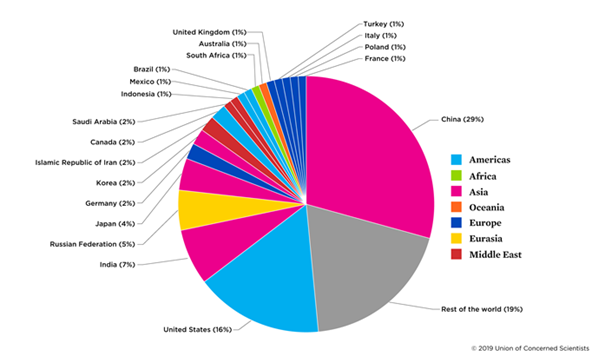What’s the Impact of Your Carbon Footprint?
Most of our actions generate carbon emissions, which contribute to accelerating global warming. Climate change poses a threat to species across the globe. As extreme weather threatens humans directly, other broad changes in habitats like the arctic, rainforests, and the ocean, are endangering wildlife —which we depend on!
Sustainability experts suggest that changing our lifestyles can significantly decrease the amount of planet-warming emissions we unintentionally release into the atmosphere as a result of our daily lives. We have gathered some statistics to help you better understand your personal impact on the planet and what actions you can take to reduce your carbon footprint, decreasing your personal impact on our climate.
Global Carbon Emissions
A handful of countries account for the majority of the world’s carbon dioxide emissions each year, with China responsible for 29 percent, the U.S. 16 percent. The new reports show how each region is dealing with its own unique challenges.
Source: Annual Report for 2019

Around the world, the average person is responsible for about 5.3 tons of fossil carbon dioxide emissions per year. By comparison, the average person in the U.S. is responsible for more than three-and-a-half times that amount. Strong inequalities still exist, particularly in oil use. For example, U.S. oil consumption per person is 16 times greater than in India and 6 times greater than in China. Vehicle ownership is similarly skewed, with almost one motor vehicle per person in the U.S. but only one for every 40 people in India and 6 in China. Source
But Here is the Good News
The U.S. saw the largest decline in energy-related CO2 emissions in 2019 on a country basis – a fall of 140 Megatons, or 2.9%, to 4.8 Gigatons. U.S. emissions are now down almost 1 Gigaton from their peak in the year 2000, the largest most efficient decline by any country over that period. Source
3 Lifestyle Changes to Reduce Your Carbon Footprint
Most people don’t realize just how much of an impact that they have as an individual. We contribute to carbon emissions throughout our daily routines with our means of transportation, our energy usage, and our diets.
Your Home Energy
The average American’s diet is responsible for almost nine tons of carbon emissions every year. Eating red meat is particularly carbon-intensive. Beef has a much higher carbon footprint than grains and veggies. Beef requires 28 times more land to produce than pork or chicken. This doesn’t mean you necessarily have to give up steaks and cheeseburgers altogether. Even small changes in diet can have a big effect on emissions. Many individuals are choosing plant-based diets, but even just taking part in “Meatless Mondays” can help to reduce your carbon footprint.
Your Diet
A big energy-demanding house or a small efficient living space? Heating a house is said to generate nearly 5,000 pounds of CO2 every year. Small spaces however save energy on heating. Another way around this is considering renewable energy sources like solar to power your property. Unlike traditional energy sources such as gas and oil, solar doesn’t emit greenhouse gases. With solar energy, you can power a home of any size guilt-free!
Your Daily Commute
Driving to and from work, especially if you live in the suburbs, can add pounds of carbon to your output. Thinking about buying a car? Consider something fuel-efficient; electric and hybrids can cut your average annual vehicle emissions in half! Public transportation is even more efficient than cars though. An average ride on the New York City subway saves each rider about 10 pounds of CO2 emissions, compared to traveling the same distance by car, according to the New York Metropolitan Transportation Authority.
These changes only make small differences for your day to day life, yet every effort counts. More and more people invest in solar energy to help save our environment and also hundreds of electricity bills! One has to agree that investing in solar energy is a practical way to reduce your energy consumption without changing your overall lifestyle.



